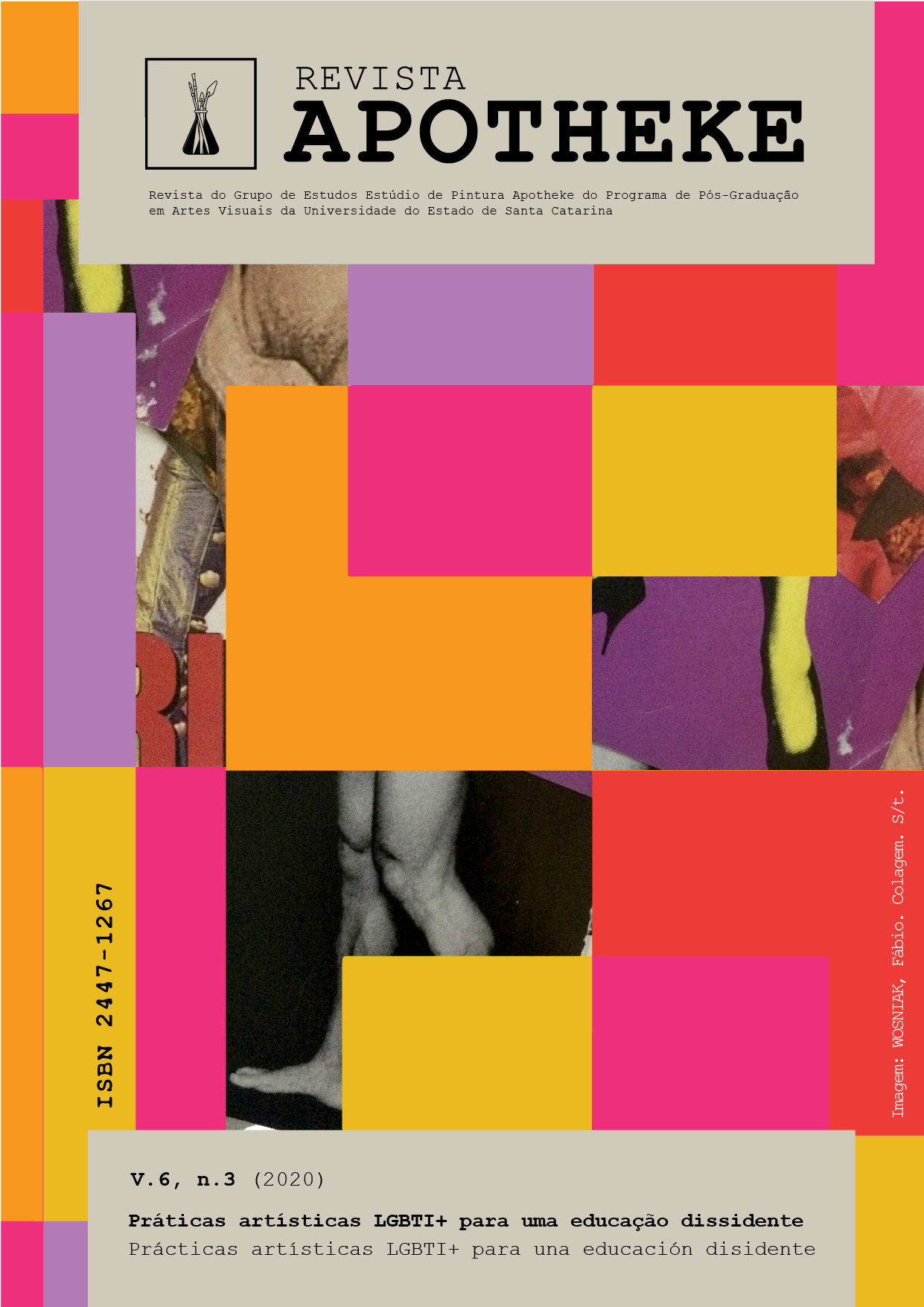Vivência lesbiana em Cassandra Rios: Eu sou uma lésbica
DOI:
https://doi.org/10.5965/24471267632020118Palavras-chave:
Cassandra Rios , escritos lesbianos , ditadura militar no Brasil , lesbianidade, produção artística LGBTIResumo
O presente texto abarca a pesquisa sobre Cassandra Rios (1932), lésbica e escritora lesbiana de grande notoriedade para o Brasil. O contexto da maior parte de sua produção literária deu-se em período ditatorial, no qual suas obras sofreram severas censuras e perseguições. O rumo desta produção, busca refletir acerca da obra "Eu sou uma lésbica" (1980), escrita em folhetim, contando com diversas edições após este. Na produção, Flávia reconhece sua identidade de gênero revisitando seu passado e transcrevendo em tom narrativo, bem como, tudo que envolvia e envolve ser uma mulher lésbica, como a violência velada até os dias atuais. O tema homossexualidade feminina se torna âmago de todo este processo, no qual vida e obra de Cassandra demonstram fundamental relevância artístico-social. Também são apresentadas considerações quanto a escrita biográfica não-autobiografada da autora, a qual, por meio de suas produções revela sua perspectiva quanto não apenas o ser mulher, bem como sua vivência lésbica.
Downloads
Referências
BERLANT, Laurent e WARNER, Michael. Sexo em Público. In: Jiménez, Rafael M. M. (org.).
Sexualidades Transgressoras. Barcelona: Içaria, 2002.
BRUNO, Giordano. Correspondências. São Paulo. Editora Hedra, 2012.
DWORKIN, Andrea. The power of words. Massachusetts Daily Occupied Collegian, Vol. 1, No. 1, May 8, 1978.
KORICH, Hanna, realizador. Cassandra Rios: a safo de perdizes. 2013. LEJEUNE, P. O pacto autobiográfico. Belo Horizonte: Editora UFMG, 2014.
LONDERO, Rodolfo Rorato. Pornografia e censura: Adelaide Carraro, Cassandra Rios e o sistema literário brasileiro nos anos 1970. Eduel, 2016.
RICH, Adrienne. Compulsory Heterosexuality and Lesbian Existence. Journal of Women’s History, vol. 15, no. 3, 2003, pp. 11-48.
RIOS, Cassandra. Eu sou uma lésbica. Rio de Janeiro: Record, 1981.
, Cassandra. A perseguida. Revista TPM. São Paulo: Trip Propaganda e Editora, n.3, jul.2001. p.2-11. Entrevista concedida a Fernando Luna.
, Cassandra. Censura: minha luta meu amor. São Paulo: Global editora e distribuidora, 1977.
WITTIG, Monique. The straight mind and other essays. Boston: Beacon, 1992. ZIMMERMAN, Bonnie. The Safe Sea of Women: Lesbian Fiction, 1969-1989. Beacon, 1990.
Downloads
Publicado
Como Citar
Edição
Seção
Licença
Copyright (c) 2021 Violeta Sutili, Leila Pessoa

Este trabalho está licenciado sob uma licença Creative Commons Attribution-NonCommercial 4.0 International License.
Os autores de trabalhos submetidos à Revista APOTHEKE autorizam sua publicação em meio físico e eletrônico, unicamente para fins acadêmicos, podendo ser reproduzidos desde que citada a fonte. Os mesmos, atestam sua originalidade, autoria e ineditismo.
Os artigos publicados pela revista são de uso gratuito, destinados a aplicações
acadêmicas e não comerciais. Os direitos autorais são todos cedidos à revista. Os artigos cujos autores são identificados representam a expressão do ponto de vista de seus autores e não a posição oficial da Revista Apotheke. O(s) autor(es) se compromete(m) a sempre que publicar material referente ao artigo publicado na Revista Apotheke mencionar a referida publicação da seguinte forma:
"Este artigo foi publicado originalmente pela revista Apotheke em seu volume (colocar o volume), número (colocar o número) no ano de (colocar o ano) e pode ser acessado em: http://www.revistas.udesc.br/index.php/APOTHEKE/index"
É responsabilidade dos autores a obtenção da permissão por escrito para usar em seus artigos materiais protegidos pela Lei de Direitos Autorais. A revista Apotheke não é responsável por quebras de direitos autorais feitas por seus colaboradores.
Os autores mantêm os direitos autorais e concedem à revista o direito de primeira publicação, com o trabalho licenciado sob Licença Creative Commons do tipo atribuição BY-NC:
Atribuição (BY): os licenciados têm o direito de copiar, distribuir, exibir e executar a obra e fazer trabalhos derivados dela, conquanto que deem créditos devidos ao autor ou licenciador, na maneira especificada por estes.
Uso Não comercial (NC): os licenciados podem copiar, distribuir, exibir e executar a obra e fazer trabalhos derivados dela, desde que sejam para fins não comerciais.
Após a publicação dos artigos, os autores permanecem com os direitos autorais e de republicação do texto.




